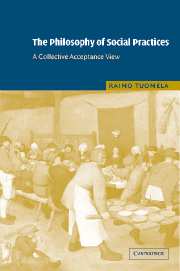Book contents
- Frontmatter
- Contents
- List of figures
- Acknowledgments
- Introduction
- 1 Collective intentionality and the construction of the social world
- 2 Collective intentionality
- 3 Conceptual activity, rule following, and social practices
- 4 An account of social practices
- 5 A Collective Acceptance account of collective-social notions
- 6 Social institutions
- 7 Social practices in a dynamic context: a mathematical analysis
- Epilogue
- Notes
- References
- Index
3 - Conceptual activity, rule following, and social practices
Published online by Cambridge University Press: 22 September 2009
- Frontmatter
- Contents
- List of figures
- Acknowledgments
- Introduction
- 1 Collective intentionality and the construction of the social world
- 2 Collective intentionality
- 3 Conceptual activity, rule following, and social practices
- 4 An account of social practices
- 5 A Collective Acceptance account of collective-social notions
- 6 Social institutions
- 7 Social practices in a dynamic context: a mathematical analysis
- Epilogue
- Notes
- References
- Index
Summary
INTRODUCTION
Several philosophers, most notably Ludwig Wittgenstein (1953) and Wilfrid Sellars (1963), have argued that social practices, qua central elements of “forms of life,” are conceptually crucial for conceptual activity. This is because they – or rather some fundamental kinds of them – in some instances are themselves inherently conceptual activities. This entails that they are activities which do not psychologically depend on the participants' following rules or meeting standards of any kind. This feature of social practices can be used to argue that the correctness of activities such as rule following and in general the application of concepts to the world crucially depends on the social practices of the community in question. Basic social practices are a kind of “discussion stopper” and form the irreducible and noncircular conceptual fundamenta of conceptual activities, according to this line of thought. The same communitarian idea can be applied to argue that language – or rather language use – is conceptually prior to thinking, even if thoughts may be argued to cause action. This is what Sellars (1963) argues. I will conduct part of my discussion within a Sellarsian framework (although without accepting all of his central views). Furthermore, I will not accept strong communitarianism, nor does Sellars.
Let me here say briefly what I mean by action and how I use some central related terms. When I speak of a strictly intentional action, I mean action performed on purpose.
- Type
- Chapter
- Information
- The Philosophy of Social PracticesA Collective Acceptance View, pp. 40 - 77Publisher: Cambridge University PressPrint publication year: 2002



